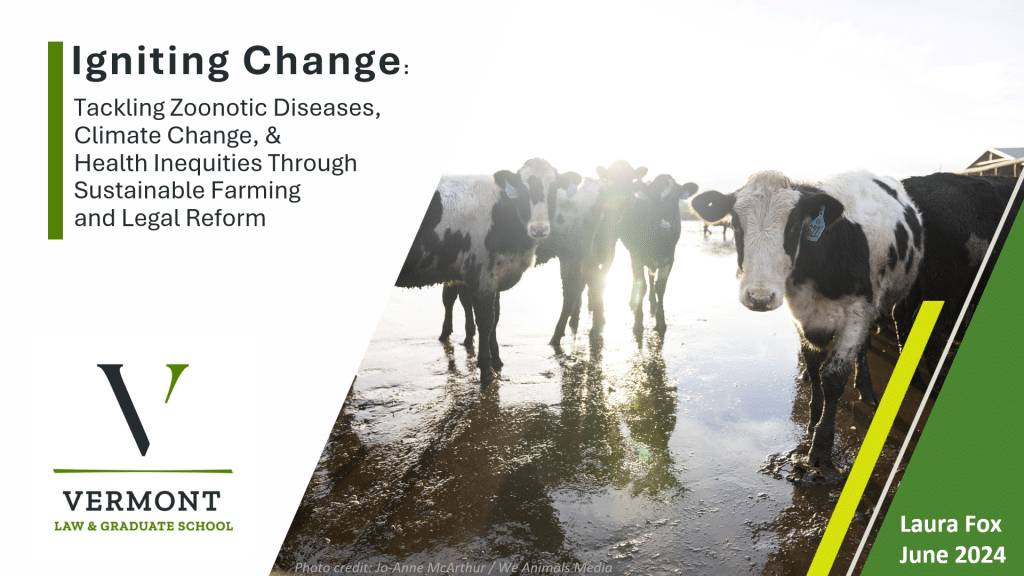
The 10th Annual International Conference on Public Health, hosted by the Athens Institute for Education & Research, featured a compelling presentation by Professor Laura Fox, director of the Farmed Animal Advocacy Clinic, titled “Igniting Change: Tackling Zoonotic Diseases, Climate Change, and Health Inequities through Sustainable Farming and Legal Reform.” Her presentation highlighted the urgent need for a comprehensive and multifaceted prevention effort to the escalating threats posed by factory farming, which include zoonotic diseases, climate change, and global health inequities.
Understanding the Crisis
Professor Fox’s presentation builds upon her previous work, “Playing with Fire: Factory Farming, Zoonotic Diseases, Climate Change, and the Global Health Inequity Crisis,” co-authored with Logan Volpe, FAAC’s litigation paralegal, delving into the complex interplay between industrial animal agriculture and these global challenges. Central to this crisis are Concentrated Animal Feeding Operations (CAFOs), which, through overcrowding and the misuse of antibiotics, create environments ripe for the emergence and rapid spread of zoonotic diseases. These practices not only pose significant threats to human and animal health but also exacerbate climate change and widen the chasm of health inequities worldwide.
Environmental Justice and Public Health
A key focus of Professor Fox’s presentation was the disproportionate impact of CAFOs on marginalized communities. The location and operation of these facilities often lead to severe environmental justice issues, as these communities bear the brunt of pollution, disease outbreaks, and antibiotic resistance. This highlights the pressing need for a holistic approach to mitigation, prevention, and adaptation.
A Holistic Approach
Professor Fox proposed several strategies to address these interconnected issues:
1. Sustainable Farming Practices: Transitioning to less intensive forms of animal agriculture can mitigate the risks associated with CAFOs. This includes rethinking agricultural subsidies and trade agreements to incentivize sustainable practices.
2. Legal and Policy Reforms: Implementing meaningful legal and policy changes is crucial. These reforms should aim to reduce the environmental and health impacts of industrial farming while promoting sustainable agriculture.
3. Education and Awareness: Public understanding of the link between factory farming, zoonotic diseases, antibiotic resistance, and climate change is crucial. Education and awareness campaigns can drive change by influencing consumer behavior and policy decisions.
4. International Cooperation: Global challenges require global solutions. International cooperation and the sharing of knowledge and resources are vital for addressing these issues comprehensively. There is a particular need for global efforts to prevent the spread of industrialized animal agriculture, a largely U.S. invention. Professor Fox called for foreign pressure and trade restrictions on U.S. factory farm products to curb the global proliferation of these harmful practices.
Expanding the Conversation
Professor Fox’s presentation was delivered to an international audience of public health researchers, scientists, and doctors. This broader audience is crucial for interjecting animal interests into the global public health conversation. The work being done at the Farmed Animal Advocacy Clinic aims not only to highlight these critical issues but also to foster international collaboration and drive systemic change in public health and animal welfare.
Professor Fox’s presentation at the Athens Institute for Education & Research’s 10th Annual International Conference on Public Health underscored the urgency of addressing the intertwined issues of zoonotic diseases, climate change, and health inequities. By embracing sustainable farming practices, enacting legal and policy reforms, and fostering international cooperation, we can mitigate these threats and ensure a more equitable and sustainable future for all. Professor Fox’s call to action is a crucial step towards igniting change and safeguarding our planet’s health.
Other Conference Highlights
In addition to her presentation, Professor Fox moderated a diverse panel discussion that covered a range of critical public health topics. The panel featured experts from various fields and countries, addressing subjects such as predicting healthcare needs and mortality, racial health disparities, fertility issues in obese men, and the socio-economic factors affecting the survival of HIV/AIDS patients. This diversity of topics and panelists enriched the discussion, providing a comprehensive view of the multifaceted nature of public health challenges.
Professor Fox also participated as a discussant in a round-table discussion on “The Future of Sciences and Engineering Education & Research.” These discussions emphasized the need to adapt educational practices and research methodologies to meet the evolving demands of society and the environment.